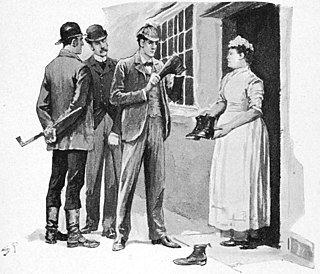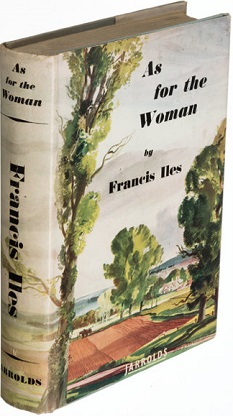
Dame Agatha Mary Clarissa Christie, Lady Mallowan, was a British author known for her 66 detective novels and 14 short story collections, particularly those revolving around fictional detectives Hercule Poirot and Miss Marple. She also wrote the world's longest-running play, the murder mystery The Mousetrap, which has been performed in the West End of London since 1952. A writer during the "Golden Age of Detective Fiction", Christie has been called the "Queen of Crime"—a moniker which is now trademarked by her estate—or the "Queen of Mystery". She also wrote six novels under the pseudonym Mary Westmacott. In 1971, she was made a Dame (DBE) by Queen Elizabeth II for her contributions to literature. Guinness World Records lists Christie as the best-selling fiction writer of all time, her novels having sold more than two billion copies.

Detective fiction is a subgenre of crime fiction and mystery fiction in which an investigator or a detective—whether professional, amateur or retired—investigates a crime, often murder. The detective genre began around the same time as speculative fiction and other genre fiction in the mid-nineteenth century and has remained extremely popular, particularly in novels. Some of the most famous heroes of detective fiction include C. Auguste Dupin, Sherlock Holmes, Kogoro Akechi, and Hercule Poirot. Juvenile stories featuring The Hardy Boys, Nancy Drew, and The Boxcar Children have also remained in print for several decades.

Crime fiction, detective story, murder mystery, mystery novel, and police novel are terms used to describe narratives that centre on criminal acts and especially on the investigation, either by an amateur or a professional detective, of a crime, often a murder. Most crime drama focuses on criminal investigation and does not feature the courtroom. Suspense and mystery are key elements that are nearly ubiquitous to the genre.

Ellery Queen is a pseudonym created in 1928 by the American detective fiction writers Frederic Dannay (1905–1982) and Manfred Bennington Lee (1905–1971). It is also the name of their main fictional detective, a mystery writer in New York City who helps his police inspector father solve baffling murder cases. From 1929 to 1971, Dannay and Lee wrote around forty novels and short story collections in which Ellery Queen appears as a character.

Phyllis Dorothy James White, Baroness James of Holland Park, known professionally as P. D. James, was an English novelist and life peer. Her rise to fame came with her series of detective novels featuring the police commander and poet, Adam Dalgliesh.

John Dickson Carr was an American author of detective stories, who also published using the pseudonyms Carter Dickson, Carr Dickson, and Roger Fairbairn.

Mystery is a fiction genre where the nature of an event, usually a murder or other crime, remains mysterious until the end of the story. Often within a closed circle of suspects, each suspect is usually provided with a credible motive and a reasonable opportunity for committing the crime. The central character is often a detective, who eventually solves the mystery by logical deduction from facts presented to the reader. Some mystery books are non-fiction. Mystery fiction can be detective stories in which the emphasis is on the puzzle or suspense element and its logical solution such as a whodunit. Mystery fiction can be contrasted with hardboiled detective stories, which focus on action and gritty realism.
Desmond Bagley was an English journalist and novelist known mainly for a series of bestselling thrillers. He and fellow British writers such as Hammond Innes and Alistair MacLean set conventions for the genre: a tough, resourceful, but essentially ordinary hero pitted against villains determined to sow destruction and chaos for their own ends.

The Detection Club was formed in 1930 by a group of British mystery writers, including Agatha Christie, Dorothy L. Sayers, Ronald Knox, Freeman Wills Crofts, Arthur Morrison, Hugh Walpole, John Rhode, Jessie Rickard, Baroness Emma Orczy, R. Austin Freeman, G. D. H. Cole, Margaret Cole, E. C. Bentley, Henry Wade, Constance Lindsay Taylor and H. C. Bailey. Anthony Berkeley was instrumental in setting up the club, and the first president was G. K. Chesterton. There is a fanciful initiation ritual with an oath written by Sayers, and the club holds regular dinner meetings in London.

The Notting Hill Mystery (1862–1863) is an English-language detective novel written under the pseudonym Charles Felix, with illustrations by George du Maurier. The author's identity was never revealed, but several critics have suggested posthumously Charles Warren Adams (1833–1903), a lawyer known to have written other novels under pseudonyms. It is seen as one of the first detective novels in the English language, if not the first.

Lawrence Block is an American crime writer best known for two long-running New York-set series about the recovering alcoholic P.I. Matthew Scudder and the gentleman burglar Bernie Rhodenbarr. Block was named a Grand Master by the Mystery Writers of America in 1994. Block has written in the genres of crime, mystery, and suspense fiction for more than half a century, releasing over 100 books.

The Golden Age of Detective Fiction was an era of classic murder mystery novels of similar patterns and styles, predominantly in the 1920s and 1930s. The Golden Age proper is in practice usually taken to refer to a type of fiction which was predominant in the 1920s and 1930s but had been written since at least 1911 and is still being written.
Otto Penzler is an American editor of mystery fiction, and proprietor of The Mysterious Bookshop in New York City.
Kenneth Martin Edwards is a British crime novelist, whose work has won multiple awards including lifetime achievement awards for his fiction, non-fiction, short fiction, and scholarship in the UK and the United States. In addition to translations into various European languages, his books have been translated into Japanese, Chinese, Korean, and Taiwanese. As a crime fiction critic and historian, and also in his career as a solicitor, he has written non-fiction books and many articles. He is the current President of the Detection Club and in 2020 was awarded the Crime Writers' Association's Diamond Dagger, the highest honour in British crime writing, in recognition of the "sustained excellence" of his work in the genre.

Benjamin Allen H. "Ben" Winters is an American author. He is best known for mystery/sci-fi novels such as The Last Policeman and Underground Airlines, and for creating the CBS show Tracker.

Robert Thorogood is an English screenwriter and Sunday Times Bestselling novelist. He created the BBC One murder mystery series Death in Paradise as well as co-created two spin-off shows from it, Beyond Paradise and Return to Paradise. Since then, he's written The Marlow Murder Club series of murder mystery novels, which he turned into a TV series for PBS and UKTV.
Wendy Corsi Staub is an American writer of suspense novels and young adult fiction. She has written under her own name as well as Wendy Brody, Wendy Markham, and Wendy Morgan.
John George Haslette Vahey was a versatile and prolific Northern Irish author of detective fiction in the genre's Golden Age in the 1920s and 1930s. Although his work has remained largely out of print since the end of the golden age, he is now enjoying a resurgence of popularity, and some of his work is again in print, or available as e-books.

Cicely Disappears is a 1927 mystery novel by the British writer Anthony Cox, written under the pen name of A. Monmouth Platts. Cox used a variety of pseudonyms during his career, in this case based on two properties he was associated with in Watford. Cox had enjoyed success with novels featuring his private detective Roger Sheringham, at first published anonymously, and also wrote a number of stand-alone novels such as this one.

As for the Woman is a 1939 novel by the British writer Anthony Berkeley, written under the pen name of Francis Iles. It was the final novel of Berkeley, a key writer of the Golden Age of Detective Fiction, as he concentrated on reviewing after this point. He later told fellow writer John Dickson Carr that he produced the book during a period of great emotional strain and that its poor commercial and critical reception affected him badly. Thereafter he turned down all offers to write further novels. Although two further novels under the Iles name were announced by the publisher, neither of them were ever released.














